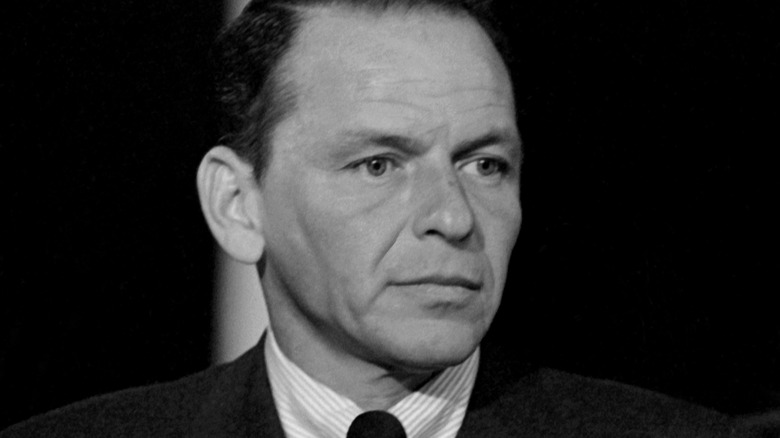Why Singing Frank Sinatra's My Way Was A Death Sentence For Some In The Philippines
Amid the continued popularity of rock music in the mid-to-late '60s, Frank Sinatra had a bit of a career renaissance well into his middle age. "Strangers in the Night" and "That's Life" both cracked the Top 5 of the pop charts in 1966, and the former song, in fact, was his very first No. 1 single on the Billboard Hot 100. And with his daughter Nancy's singing career taking off at around the same time, the duo teamed up for Ol' Blue Eyes' second No. 1 single, the 1967 hit "Somethin' Stupid." All these songs remain beloved classics to this very day, but in terms of popularity through the years, none of them arguably hold a candle to a certain song he released a few years later — "My Way."
Originally composed in French by Jacques Revaux, Claude Francois, and Gilles Thibaut and rewritten in English by 1950s teen idol Paul Anka (via France 24), "My Way" was only a moderate hit stateside, peaking at No. 27 in the spring of 1969. But it's been covered by everyone from Elvis Presley to Sid Vicious (with the latter version memorably playing in the end credits of "Goodfellas"), and if you ask a random person on the street to name a Frank Sinatra song, chances are a good many of them will mention "My Way."
Unfortunately for many Filipinos, "My Way" doesn't exactly evoke images of an iconic singer and one of his signature tunes. Instead, it evokes images of supposedly bad singers — ordinary people unwinding by singing some karaoke — getting killed after belting out the song.
Over a dozen people have been killed for singing the song on karaoke
Ideally, karaoke night should be a fun night for everyone involved; it should be a chance for you to sing to your heart's content without fear of being judged for having a voice worthy of an "American Idol" reject. That's not always the case in the Philippines, where several people have been murdered for singing Frank Sinatra's "My Way" on karaoke.
The country's first known "My Way" killing likely took place in January 1998 following an altercation between two groups of men at a karaoke bar in the province of Pangasinan. By the early 2010s, the "My Way" killings had become a phenomenon of sorts, as authorities believe at least 12 people were killed between 2002 and 2012 in relation to the song (via Esquire Philippines). And it wasn't just karaoke bar customers behind the killings; in 2007, a security guard at one such establishment pulled out his gun and fatally shot a 29-year-old man for his purportedly poor rendition of "My Way."
As recently as 2018, people were still getting murdered in cold blood for singing the tune. During this instance, the victim, a 60-year-old man, allegedly angered his 28-year-old neighbor at a birthday party when he grabbed the microphone from him just as "My Way" started playing on the karaoke machine. This resulted in a physical altercation, which ended when the younger man stabbed the victim, who later died at the hospital.
The lyrics just might be too arrogant
While the first few lines of "My Way" suggest that they're coming from a man whose days may be numbered, the rest of the song emphasizes how the subject lived his life with regrets that are "too few to mention" and always found a way to rise above the challenges whenever he had "[bitten] off more than [he] can chew." One can say that those lyrics smack of macho braggadocio, which may be why karaoke bar patrons, oftentimes with their judgment clouded by alcohol, resort to violence whenever someone takes to the mic and sings the Frank Sinatra classic.
"'I did it my way' — it's so arrogant," said Butch Albarracin, owner of Manila-based singing school Center for Pop, in an interview with The New York Times. "The lyrics evoke feelings of pride and arrogance in the singer, as if you're somebody when you're really nobody. It covers up your failures. That's why it leads to fights."
Even Sinatra himself was not a fan of "My Way" and its lyrical tone. According to GQ, Ol' Blue Eyes would oftentimes mock the tune during live performances. "And of course, the time comes now for the torturous moment—not for you, but for me," Sinatra reportedly told the audience during a 1979 show before loudly proclaiming his hatred for the song. And as his daughter Tina recalled (via BBC), he "always thought that song was self-serving and self-indulgent."
As Frank Sinatra died in 1998, we can only wonder how he would have felt had the "My Way" killings been a thing when he was still alive.
Breaking the unwritten rules of karaoke
The lyrics may be one factor behind the "My Way" killings, but it's not the only one. Like many other things, karaoke has its own set of unwritten rules, and these are vigorously enforced in the Philippines. For one, it's never cool to laugh at a karaoke singer's off-key warbling. As The New York Times wrote, most of the killings related to the Sinatra song took place because someone was laughing at another person's substandard version of the tune. Then you've got the rest of what can be called the "karaoke code" — don't grab the microphone from somebody's hands, don't select a song that's already been performed, don't spend too much time on the mic, etc.
According to University of the Philippines professor Roland Tolentino, it's these violations of etiquette that often lead to violent incidents during karaoke sessions. "The Philippines is a very violent society, so karaoke only triggers what already exists here when certain social rules are broken," he said, also agreeing that the aforementioned lyrics of "My Way" can be a trigger to some individuals.
As a result of the dangers associated with singing "My Way" on karaoke, some Filipinos have purposely avoided singing the song at bars. Others have banned "My Way" requests, even at family gatherings. But even with those safeguards in place, the first line of "My Way" seemingly still has the chance of becoming eerily prophetic whenever its corresponding number is entered into the karaoke machine.



